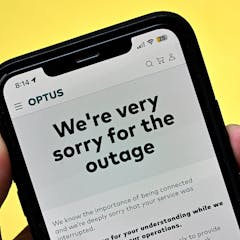
Articles on Internet
Displaying 1 - 20 of 633 articles

Think you can trust every website? One typo and you could be caught in a phishing trap.

Regulating how kids access the internet – including social media – must balance protection from harm with children’s rights to expression and information.

Contrary to what you may have heard, your mindset may be the biggest thing affecting how social media connects to your wellbeing.

Young people use social media to connect with culture and community, and to have a voice on political issues that concern them.

The prevailing human reaction to the idea of artificial intelligence has always been fear, revealed in the way film has portrayed our increasingly important relationship with AI over the years.

There are various methods for estimating or verifying an online user’s age, none of them foolproof. Importantly, is this the social media future we want?

The internet is increasingly necessary to participate in everyday life. Empowering communities to build and maintain their own broadband networks can provide much-needed access.

Is most of the content on the internet fake? Here’s what the dead internet theory really means – and why we should be warier of how we’re manipulated for profit and political gain.

A new parliamentary committee will look into how social media operates in Australia, including how children access it. Regulating the industry won’t be easy.

Using Australian laws to force a foreign-owned platform to take down content globally sets a risky precedent – should we allow all countries to impose their laws on the internet?

The 485 multiterabit-per-second undersea data cables that span the world’s oceans link the globe and maintain the digital realm.

The benefits of AI are transforming modern life — but disparities in digital confidence are leaving some behind.

In sub-Saharan Africa, most governments welcome China’s investment in digital infrastructure.

Your data privacy is under threat from hackers, data brokers and big tech. Here’s what you can do about it. Step 1 is to get your colleagues, friends and family on board.

Granger, who died in December 2023, is credited with making avocado toast fashionable. Little did he know that his lasting legacy would inspire a meme that symbolized generational tension.

New research reveals the digital divide that was exposed by the COVID pandemic.

It’s the fourth most popular website in the world, but our new study shows toxic commentary can still thrive on Wikipedia. There’s a lot at stake if too many editors are driven away.

The padlock symbol simply means that the data being sent between the web server and the user’s computer is encrypted and cannot be read by others. But many people don’t know that.

Every state is poised to receive a large amount of federal money to expand broadband access, but they have a lot of work to do to meet the government’s requirements for distributing it.

Optus says the unprecedented outage last week was caused by a ‘routine software upgrade’. An expert explains why this points to more serious problems with the network.





